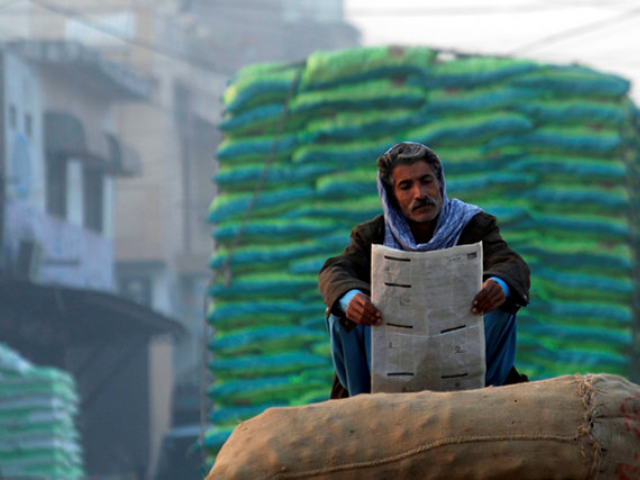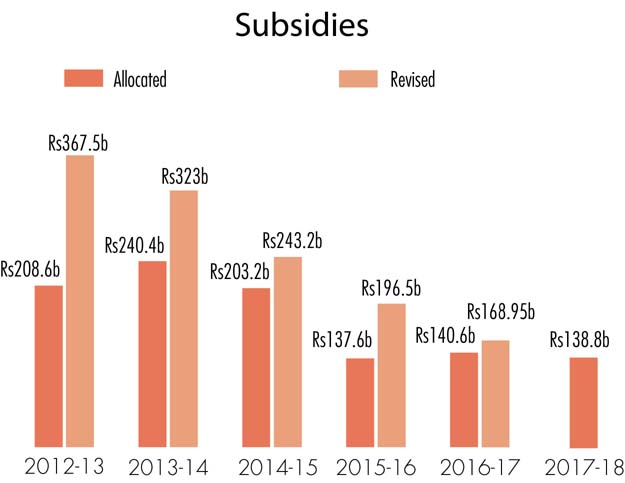
On fertiliser sales to farmers, the government has withdrawn the concession altogether. For the outgoing fiscal year 2016-17, it had earmarked Rs25.09 billion in subsidy on fertiliser sales to farmers.
PML-N will not need another IMF bailout, says Dar
Before the announcement of budget on Friday, the farmers protested in the capital city, demanding concessions on agriculture commodities. However, the city administration baton charged and fired tear gas shells to disperse the protesters.
Leader of Opposition in the National Assembly Khursheed Shah also raised the issue forcefully in support of the farmers in the lower house before the start of the budget speech by Finance Minister Ishaq Dar. However, the NA speaker did not respond to his arguments.
Overall, the subsidy bill has now been slashed slightly to Rs138.84 billion for FY18 compared to Rs140.6 billion for the outgoing fiscal year 2016-17.

In relation to the Gross Domestic Product (GDP) - the total worth of national economy - the subsidy ratio stands unchanged at 0.4% for FY18, which was similar to the level in FY17.
However, fund releases could not be restricted within the target in FY17 and actual disbursements went up to Rs168.95 billion. This came in the wake of increase in subsidy for the Water and Power Development Authority (Wapda)/Pakistan Electric Power Company (Pepco), subsidy for the fertiliser industry and support for wheat purchase from farmers.
In 2015-16, the subsidy ratio in relation to the GDP was 0.5% and a year earlier it was 0.7%.
In FY18, the subsidy allocation for Wapda/Pepco constitutes the major component at 37.8% of the total followed by subsidy for Pakistan Agriculture Storage and Supplies Corporation (Passco) and K-Electric with shares of 11.9% and 11.2% respectively.
With the fresh allocation, the government expects to provide some cushion to the consumers of electricity, wheat, sugar, pulses, rice and tea. However, it remains unclear whether it will be able to keep itself within the ceiling or grossly overshoot the target as happened in the outgoing year.
According to the budget documents, out of the overall subsidy, Rs102.5 billion has been set aside for subsidising power supply, excluding K-Electric consumers. Of this, Rs65 billion will cover tariff differential claims of state-owned power distribution companies and Rs10 billion will be utilised to pick up receivables from the Federally Administered Tribal Areas (Fata) against Rs9.9 billion in FY17.
Separately, Rs4 billion will be spent on clearing arrears of tariff differential claims of the distribution companies.
An overdue delay in payments for such claims has been one of the factors behind the piling up of circular debt again. The debt level now stands at around Rs320 billion, though the government had cleared Rs420 billion worth of debt soon after coming to power in June 2013.
In FY17, the government had allocated Rs95.4 billion for tariff differential claims and Fata receivables, but actual disbursements were higher at Rs102.5 billion.
Another Rs8.5 billion has been earmarked for paying subsidy on agriculture tube wells in Balochistan in the upcoming fiscal year. For FY17, the government had allocated Rs8.4 billion, but provided only Rs1.68 billion.
To provide relief to the consumers of K-Electric, which provides electricity to the country’s largest city, the subsidy amount has been set at Rs15.5 billion. In FY17, a higher amount - Rs22.5 billion - had been set aside for the power company, but later it was revised downwards to Rs15.4 billion.
In a major setback for the industry, no subsidy has been announced for the next year, though it got Rs4.65 billion in the outgoing year.
Essential goods
The government has made a drastic cut in subsidy on the sale of sugar and Ramazan package for the next fiscal year. The Utility Stores Corporation will receive Rs4 billion, down 43% from Rs7 billion in FY17.
Of this, Rs2 billion will be spent on clearing the arrears of sugar sale and Rs1.5 billion will cover the Ramazan package. Another Rs500 million has been earmarked for the sale of subsidised pulses, rice and tea.
The cushion for Passco has been jacked up to Rs16.54 billion against FY17’s target of Rs15.3 billion, which will go for wheat purchase and keeping the staple’s reserves to stabilise market prices.
‘Upcoming budget can make or break Pakistan’s economy’
However, actual disbursements in FY17 went up to Rs18.55 billion on the back of support for wheat purchase from farmers and sugar export.
In FY18, of the Rs16.54 billion for Passco, Rs2 billion will go for wheat buying, Rs5 billion for keeping wheat stocks, Rs1.5 billion for freight subsidy on wheat exports and Rs8.04 billion for clearing arrears of supplies made to Gilgit-Baltistan. Apart from these, Rs300 million will be disbursed for wheat sale to Fata.
Published in The Express Tribune, May 27th, 2017.
Like Business on Facebook, follow @TribuneBiz on Twitter to stay informed and join in the conversation.








1719053250-0/BeFunky-collage-(5)1719053250-0-270x192.webp)








COMMENTS
Comments are moderated and generally will be posted if they are on-topic and not abusive.
For more information, please see our Comments FAQ